- Home
- Henry James
Glasses Page 2
Glasses Read online
Page 2
But it was not in truth of these things I was thinking; what was uppermost in my mind was a matter which, though it had no sort of keeping, insisted just then on coming out.
“Is it true, Miss Saunt,” I suddenly demanded, “that you’re so unfortunate as to have had some warning about your beautiful eyes?”
I was startled by the effect of my words; the girl threw back her head, changing colour from brow to chin. “True? Who in the world says so?” I repented of my question in a flash; the way she met it made it seem cruel, and I felt my mother look at me in some surprise. I took care, in answer to Flora’s challenge, not to incriminate Mrs. Meldrum. I answered that the rumour had reached me only in the vaguest form and that if I had been moved to put it to the test my very real interest in her must be held responsible.
Her blush died away, but a pair of still prettier tears glistened in its track. “If you ever hear such a thing said again you can say it’s a horrid lie!” I had brought on a commotion deeper than any I was prepared for; but it was explained in some degree by the next words she uttered: “I’m happy to say there’s nothing the matter with any part of me whatever, not the least little thing!”
She spoke with her habitual complacency, with triumphant assurance; she smiled again, and I could see how she wished that she hadn’t so taken me up. She turned it off with a laugh. “I’ve good eyes, good teeth, a good digestion and a good temper. I’m sound of wind and limb!” Nothing could have been more characteristic than her blush and her tears, nothing less acceptable to her than to be thought not perfect in every particular. She couldn’t submit to the imputation of a flaw. I expressed my delight in what she told me, assuring her I should always do battle for her; and as if to rejoin her companions she got up from her place on my mother’s toes. The young men presented their backs to us; they were leaning on the rail of the cliff. Our incident had produced a certain awkwardness, and while I was thinking of what next to say she exclaimed irrelevantly: “Don’t you know? He’ll be Lord Considine.” At that moment the youth marked for this high destiny turned round, and she spoke to my mother. “I’ll introduce him to you—he’s awfully nice.” She beckoned and invited him with her parasol; the movement struck me as taking everything for granted.
I had heard of Lord Considine and if I had not been able to place Lord Iffield it was because I didn’t know the name of his eldest son. The young man took no notice of Miss Saunt’s appeal; he only stared a moment and then on her repeating it quietly turned his back. She was an odd creature: she didn’t blush at this; she only said to my mother apologetically, but with the frankest sweetest amusement, “You don’t mind, do you? He’s a monster of shyness!”
It was as if she were sorry for every one—for Lord Iffield, the victim of a complaint so painful, and for my mother, the subject of a certain slight. “I’m sure I don’t want him!” said my mother, but Flora added some promise of how she would handle him for his rudeness. She would clearly never explain anything by any failure of her own appeal. There rolled over me while she took leave of us and floated back to her friends a wave of superstitious dread. I seemed somehow to see her go forth to her fate, and yet what should fill out this orb of a high destiny if not such beauty and such joy? I had a dim idea that Lord Considine was a great proprietor, and though there mingled with it a faint impression that I shouldn’t like his son the result of the two images was a whimsical prayer that the girl mightn’t miss her possible fortune.
CHAPTER IV
One day in the course of the following June there was ushered into my studio a gentleman whom I had not yet seen but with whom I had been very briefly in correspondence. A letter from him had expressed to me some days before his regret on learning that my “splendid portrait” of Miss Flora Louisa Saunt, whose full name figured by her own wish in the catalogue of the exhibition of the Academy, had found a purchaser before the close of the private view. He took the liberty of inquiring whether I might have at his service some other memorial of the same lovely head, some preliminary sketch, some study for the picture. I had replied that I had indeed painted Miss Saunt more than once and that if he were interested in my work I should be happy to show him what I had done. Mr. Geoffrey Dawling, the person thus introduced to me, stumbled into my room with awkward movements and equivocal sounds—
a long, lean, confused, confusing young man, with a bad complexion and large protrusive teeth. He bore in its most indelible pressure the postmark, as it were, of Oxford, and as soon as he opened his mouth I perceived, in addition to a remarkable revelation of gums, that the text of the queer communication matched the registered envelope. He was full of refinements and angles, of dreary and distinguished knowledge. Of his unconscious drollery his dress freely partook; it seemed, from the gold ring into which his red necktie was passed to the square toe-caps of his boots, to conform with a high sense of modernness to the fashion before the last.
There were moments when his overdone urbanity, all suggestive stammers and interrogative quavers, made him scarcely intelligible; but I felt him to be a gentleman and I liked the honesty of his errand and the expression of his good green eyes.
As a worshipper at the shrine of beauty, however, he needed explaining, especially when I found he had no acquaintance with my brilliant model; had on the mere evidence of my picture taken, as he said, a tremendous fancy to her looks. I ought doubtless to have been humiliated by the simplicity of his judgment of them, a judgment for which the rendering was lost in the subject, quite leaving out the element of art. He was like the innocent reader for whom the story is “really true” and the author a negligible quantity. He had come to me only because he wanted to purchase, and I remember being so amused at his attitude, which I had never seen equally marked in a person of education, that I asked him why, for the sort of enjoyment he desired, it wouldn’t be more to the point to deal directly with the lady. He stared and blushed at this; the idea clearly alarmed him. He was an extraordinary case—
personally so modest that I could see it had never occurred to him.
He had fallen in love with a painted sign and seemed content just to dream of what it stood for. He was the young prince in the legend or the comedy who loses his heart to the miniature of the princess beyond seas. Until I knew him better this puzzled me much—the link was so missing between his sensibility and his type.
He was of course bewildered by my sketches, which implied in the beholder some sense of intention and quality; but for one of them, a comparative failure, he ended by conceiving a preference so arbitrary and so lively that, taking no second look at the others, he expressed his wish to possess it and fell into the extremity of confusion over the question of price. I helped him over that stile, and he went off without having asked me a direct question about Miss Saunt, yet with his acquisition under his arm. His delicacy was such that he evidently considered his rights to be limited; he had acquired none at all in regard to the original of the picture. There were others—for I was curious about him—that I wanted him to feel I conceded: I should have been glad of his carrying away a sense of ground acquired for coming back. To ensure this I had probably only to invite him, and I perfectly recall the impulse that made me forbear. It operated suddenly from within while he hung about the door and in spite of the diffident appeal that blinked in his gentle grin. If he was smitten with Flora’s ghost what mightn’t be the direct force of the luminary that could cast such a shadow? This source of radiance, flooding my poor place, might very well happen to be present the next time he should turn up. The idea was sharp within me that there were relations and complications it was no mission of mine to bring about. If they were to develop they should develop in their very own sense.
Let me say at once that they did develop and that I perhaps after all had something to do with it. If Mr. Dawling had departed without a fresh appointment he was to reappear six months later under protection no less powerful than that of our young lady herself. I had seen her repeatedly for months: she had grown to rega
rd my studio as the temple of her beauty. This miracle was recorded and celebrated there as nowhere else; in other places there was occasional reference to other subjects of remark. The degree of her presumption continued to be stupefying; there was nothing so extraordinary save the degree in which she never paid for it. She was kept innocent, that is she was kept safe, by her egotism, but she was helped also, though she had now put off her mourning, by the attitude of the lone orphan who had to be a law unto herself. It was as a lone orphan that she came and went, as a lone orphan that she was the centre of a crush. The neglect of the Hammond Synges gave relief to this character, and she made it worth their while to be, as every one said, too shocking. Lord Iffield had gone to India to shoot tigers, but he returned in time for the punctual private view: it was he who had snapped up, as Flora called it, the gem of the exhibition. My hope for the girl’s future had slipped ignominiously off his back, but after his purchase of the portrait I tried to cultivate a new faith. The girl’s own faith was wonderful. It couldn’t however be contagious: too great was the limit of her sense of what painters call values.
Her colours were laid on like blankets on a cold night. How indeed could a person speak the truth who was always posturing and bragging? She was after all vulgar enough, and by the time I had mastered her profile and could almost with my eyes shut do it in a single line I was decidedly tired of its “purity,” which affected me at last as inane. One moved with her, moreover, among phenomena mismated and unrelated; nothing in her talk ever matched anything out of it. Lord Iffield was dying of love for her, but his family was leading him a life. His mother, horrid woman, had told some one that she would rather he should be swallowed by a tiger than marry a girl not absolutely one of themselves. He had given his young friend unmistakable signs, but was lying low, gaining time: it was in his father’s power to be, both in personal and in pecuniary ways, excessively nasty to him. His father wouldn’t last for ever—quite the contrary; and he knew how thoroughly, in spite of her youth, her beauty and the swarm of her admirers, some of them positively threatening in their passion, he could trust her to hold out. There were richer, cleverer men, there were greater personages too, but she liked her “little viscount” just as he was, and liked to think that, bullied and persecuted, he had her there so gratefully to rest upon. She came back to me with tale upon tale, and it all might be or mightn’t. I never met my pretty model in the world—she moved, it appeared, in exalted circles—and could only admire, in her wealth of illustration, the grandeur of her life and the freedom of her hand.
I had on the first opportunity spoken to her of Geoffrey Dawling, and she had listened to my story so far as she had the art of such patience, asking me indeed more questions about him than I could answer; then she had capped my anecdote with others much more striking, the disclosure of effects produced in the most extraordinary quarters: on people who had followed her into railway carriages; guards and porters even who had literally stuck there; others who had spoken to her in shops and hung about her house door; cabmen, upon her honour, in London, who, to gaze their fill at her, had found excuses to thrust their petrifaction through the very glasses of four-wheelers. She lost herself in these reminiscences, the moral of which was that poor Mr. Dawling was only one of a million. When therefore the next autumn she flourished into my studio with her odd companion at her heels her first care was to make clear to me that if he was now in servitude it wasn’t because she had run after him. Dawling explained with a hundred grins that when one wished very much to get anything one usually ended by doing so—a proposition which led me wholly to dissent and our young lady to asseverate that she hadn’t in the least wished to get Mr. Dawling. She mightn’t have wished to get him, but she wished to show him, and I seemed to read that if she could treat him as a trophy her affairs were rather at the ebb.
True there always hung from her belt a promiscuous fringe of scalps. Much at any rate would have come and gone since our separation in July. She had spent four months abroad, where, on Swiss and Italian lakes, in German cities, in the French capital, many accidents might have happened.
CHAPTER V
I had been again with my mother, but except Mrs. Meldrum and the gleam of France had not found at Folkestone my old resources and pastimes. Mrs. Meldrum, much edified by my report of the performances, as she called them, in my studio, had told me that to her knowledge Flora would soon be on the straw: she had cut from her capital such fine fat slices that there was almost nothing more left to swallow. Perched on her breezy cliff the good lady dazzled me as usual by her universal light: she knew so much more about everything and everybody than I could ever squeeze out of my colour-tubes. She knew that Flora was acting on system and absolutely declined to be interfered with: her precious reasoning was that her money would last as long as she should need it, that a magnificent marriage would crown her charms before she should be really pinched. She had a sum put by for a liberal outfit; meanwhile the proper use of the rest was to decorate her for the approaches to the altar, keep her afloat in the society in which she would most naturally meet her match. Lord Iffield had been seen with her at Lucerne, at Cadenabbia; but it was Mrs. Meldrum’s conviction that nothing was to be expected of him but the most futile flirtation. The girl had a certain hold of him, but with a great deal of swagger he hadn’t the spirit of a sheep: he was in fear of his father and would never commit himself in Lord Considine’s lifetime. The most Flora might achieve was that he wouldn’t marry some one else. Geoffrey Dawling, to Mrs. Meldrum’s knowledge (I had told her of the young man’s visit) had attached himself on the way back from Italy to the Hammond Synge group. My informant was in a position to be definite about this dangler; she knew about his people; she had heard of him before. Hadn’t he been a friend of one of her nephews at Oxford? Hadn’t he spent the Christmas holidays precisely three years before at her brother-in-law’s in Yorkshire, taking that occasion to get himself refused with derision by wilful Betty, the second daughter of the house?
Her sister, who liked the floundering youth, had written to her to complain of Betty, and that the young man should now turn up as an appendage of Flora’s was one of those oft-cited proofs that the world is small and that there are not enough people to go round.
His father had been something or other in the Treasury; his grandfather on the mother’s side had been something or other in the Church. He had come into the paternal estate, two or three thousand a year in Hampshire; but he had let the place advantageously and was generous to four plain sisters who lived at Bournemouth and adored him. The family was hideous all round, but the very salt of the earth. He was supposed to be unspeakably clever; he was fond of London, fond of books, of intellectual society and of the idea of a political career. That such a man should be at the same time fond of Flora Saunt attested, as the phrase in the first volume of Gibbon has it, the variety of his inclinations. I was soon to learn that he was fonder of her than of all the other things together. Betty, one of five and with views above her station, was at any rate felt at home to have dished herself by her perversity. Of course no one had looked at her since and no one would ever look at her again. It would be eminently desirable that Flora should learn the lesson of Betty’s fate.
I was not struck, I confess, with all this in my mind, by any symptom on our young lady’s part of that sort of meditation. The one moral she saw in anything was that of her incomparable aspect, which Mr. Dawling, smitten even like the railway porters and the cabmen by the doom-dealing gods, had followed from London to Venice and from Venice back to London again. I afterwards learned that her version of this episode was profusely inexact: his personal acquaintance with her had been determined by an accident remarkable enough, I admit, in connexion with what had gone before—a coincidence at all events superficially striking. At Munich, returning from a tour in the Tyrol with two of his sisters, he had found himself at the table d’hote of his inn opposite to the full presentment of that face of which the mere clumsy copy had made him dream a
nd desire. He had been tossed by it to a height so vertiginous as to involve a retreat from the board; but the next day he had dropped with a resounding thud at the very feet of his apparition. On the following, with an equal incoherence, a sacrifice even of his bewildered sisters, whom he left behind, he made an heroic effort to escape by flight from a fate of which he had already felt the cold breath. That fate, in London, very little later, drove him straight before it—drove him one Sunday afternoon, in the rain, to the door of the Hammond Synges. He marched in other words close up to the cannon that was to blow him to pieces. But three weeks, when he reappeared to me, had elapsed since then, yet (to vary my metaphor) the burden he was to carry for the rest of his days was firmly lashed to his back. I don’t mean by this that Flora had been persuaded to contract her scope; I mean that he had been treated to the unconditional snub which, as the event was to show, couldn’t have been bettered as a means of securing him. She hadn’t calculated, but she had said “Never!” and that word had made a bed big enough for his long-legged patience.
He became from this moment to my mind the interesting figure in the piece.
Now that he had acted without my aid I was free to show him this, and having on his own side something to show me he repeatedly knocked at my door. What he brought with him on these occasions was a simplicity so huge that, as I turn my ear to the past, I seem even now to hear it bumping up and down my stairs. That was really what I saw of him in the light of his behaviour. He had fallen in love as he might have broken his leg, and the fracture was of a sort that would make him permanently lame. It was the whole man who limped and lurched, with nothing of him left in the same position as before. The tremendous cleverness, the literary society, the political ambition, the Bournemouth sisters all seemed to flop with his every movement a little nearer to the floor. I hadn’t had an Oxford training and I had never encountered the great man at whose feet poor Dawling had most submissively sat and who had addressed him his most destructive sniffs; but I remember asking myself how effectively this privilege had supposed itself to prepare him for the career on which my friend appeared now to have embarked. I remember too making up my mind about the cleverness, which had its uses and I suppose in impenetrable shades even its critics, but from which the friction of mere personal intercourse was not the sort of process to extract a revealing spark. He accepted without a question both his fever and his chill, and the only thing he touched with judgment was this convenience of my friendship. He doubtless told me his simple story, but the matter comes back in a kind of sense of my being rather the mouthpiece, of my having had to put it together for him. He took it from me in this form without a groan, and I gave it him quite as it came; he took it again and again, spending his odd half-hours with me as if for the very purpose of learning how idiotically he was in love.

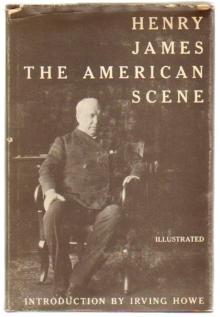 The American
The American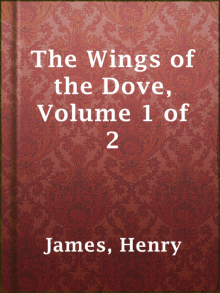 The Wings of the Dove, Volume 1 of 2
The Wings of the Dove, Volume 1 of 2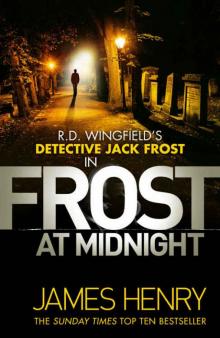 Frost at Midnight
Frost at Midnight Morning Frost
Morning Frost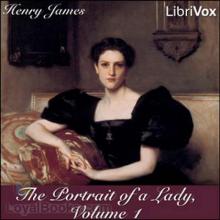 The Portrait of a Lady — Volume 1
The Portrait of a Lady — Volume 1 Fatal Frost
Fatal Frost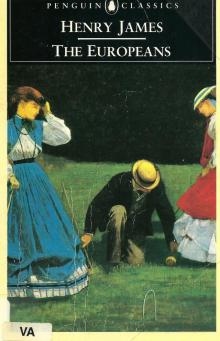 The Europeans
The Europeans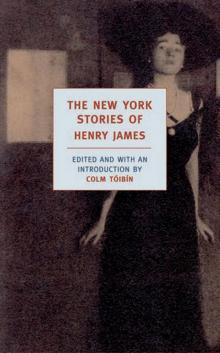 The New York Stories of Henry James
The New York Stories of Henry James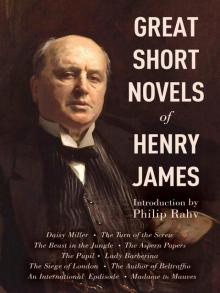 Great Short Novels of Henry James
Great Short Novels of Henry James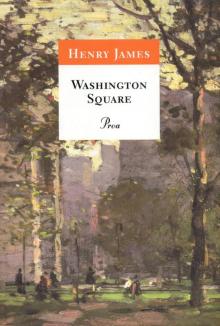 Washington Square
Washington Square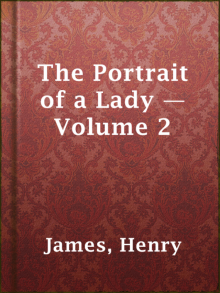 The Portrait of a Lady — Volume 2
The Portrait of a Lady — Volume 2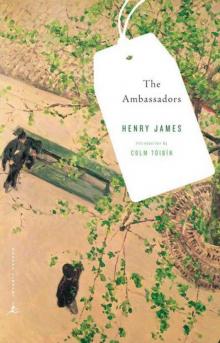 The Ambassadors
The Ambassadors The Wings of the Dove
The Wings of the Dove The Princess Casamassima (Classics)
The Princess Casamassima (Classics)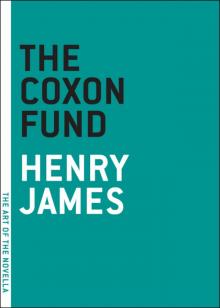 The Coxon Fund
The Coxon Fund First Frost
First Frost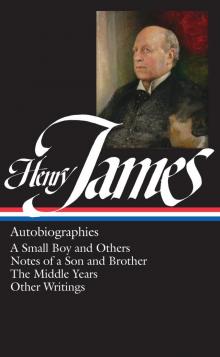 Henry James
Henry James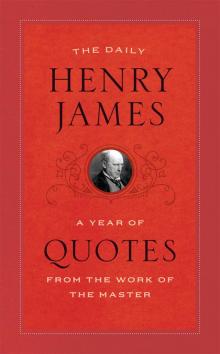 The Daily Henry James
The Daily Henry James Travels With Henry James
Travels With Henry James The Reverberator: A Novel
The Reverberator: A Novel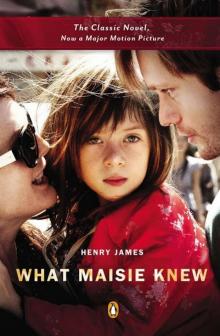 What Maisie Knew (Henry James Collection)
What Maisie Knew (Henry James Collection)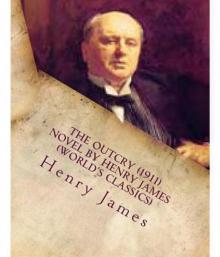 The Outcry
The Outcry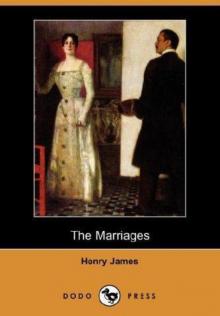 The Marriages
The Marriages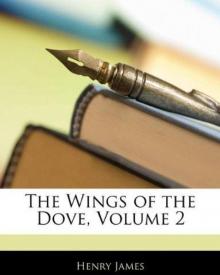 The Wings of the Dove, Volume 2
The Wings of the Dove, Volume 2 The Bostonians, Vol. I
The Bostonians, Vol. I The Outcry: -1911
The Outcry: -1911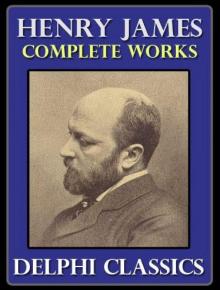 The Complete Works of Henry James
The Complete Works of Henry James Letters from the Palazzo Barbaro
Letters from the Palazzo Barbaro The Pupil
The Pupil The Bostonians, Vol. II
The Bostonians, Vol. II Pandora
Pandora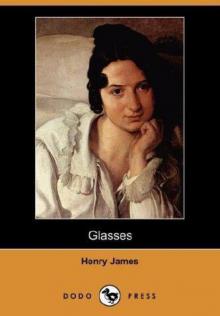 Glasses
Glasses The Princess Casamassima
The Princess Casamassima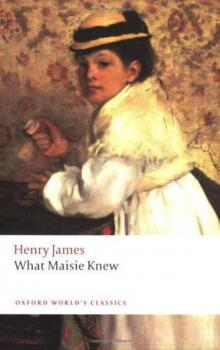 What Maisie Knew
What Maisie Knew The Reverberator
The Reverberator The Golden Bowl - Complete
The Golden Bowl - Complete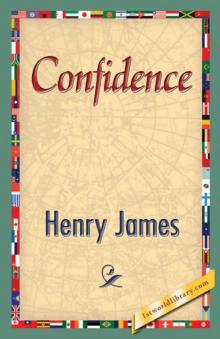 Confidence
Confidence Wings of the Dove (Barnes & Noble Classics Series)
Wings of the Dove (Barnes & Noble Classics Series) The Spoils of Poynton
The Spoils of Poynton